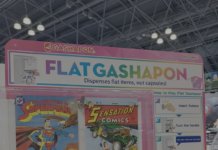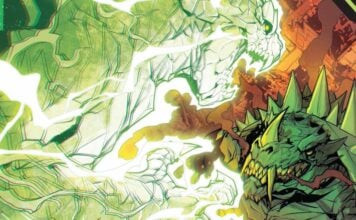Diamond and Sparkle Pop are going at it.
In all the hubbub over last week’s crucial hearing to address the sale of consignment inventory, Debtor Diamond (the entity running under bankruptcy) threatened legal action against Sparkle Pop, the company that bought Diamond Comic Distributor’s assets. The complaint was that Sparkle Pop was selling consignment inventory which they had no right to sell. And now (Zombie) Debtor Diamond has fired back with a motion to (i) force Sparkle Pop to stop selling consignment inventory, (ii) give Zombie Diamond the money that they already made from these sales, (iii) force Sparkle Pop to pay legal fees for Z. Diamond and (iv) asking for punitive damages as well.
This is not an actual lawsuit but a request for a motion to order Sparkle Pop to do all the above.
The intro lays out the basic legal complaint:
The Debtors file this motion to address ongoing, knowing and willful violations of the automatic stay by Sparkle Pop, LLC (“Sparkle Pop”). As this Court is aware, the Debtors sold certain assets to Sparkle Pop pursuant to Court Order entered May 1, 2025. As Sparkle Pop was aware, and has acknowledged, consigned inventory was expressly excluded from the sale. Nevertheless, Sparkle Pop has repeatedly sold consigned inventory and – worse yet – has refused to remit the proceeds from such sales to the Debtors. Sparkle Pop has done this despite multiple demands from the Debtors that it stop all consigned inventory sales and turn over all sale proceeds to the Debtors. Sparkle Pop’s brazen actions are clear violations of both the automatic stay and the Sparkle Pop asset purchase agreement that was approved by the Court.
Without question, the consigned inventory constitutes property of the estate for the purpose of the automatic stay. As explained below, the Debtors’ rights in the consigned inventory bring it, and the consigned inventory’s sale proceeds, within the protections of the automatic stay.
Sparkle Pop’s brazen and unauthorized actions must be stopped. The Debtors accordingly file this motion to enforce the automatic stay and obtain redress for Sparkle Pop’s actions, including actual damages, reimbursement of legal fees, and punitive damages. In the alternative, the Debtors also seek an order of the Court enforcing the Court’s prior sale order.
As dramatic as this language is, it’s not quite an “adversary proceeding” as lawsuits filed within bankruptcy proceedings are known.
But it still sets up an amazing circle jerk: Sparkle Pop is suing Alliance Entertainment for hiring former Diamond employees; Alliance is suing Diamond for misleading them about the status of the Wizards of the Coast contract; and now Diamond is laying the hammer down against Sparkle Pop for selling consignment inventory that they had no right to.
Included in Diamond’s motion against Sparkle Pop are several exhibits. Taken together they give us a roadmap of how some of this went down – and show the numbers – you can read the whole 292-page behemoth below.
Exhibit A is the proposed motion.
Exhibit B is the Asset Purchase Agreement for Sparkle Pop to buy DCD
Exhibit C is the Transition Services Agreement showing the agreement of what Debtor Diamond would do for Sparkle Pop in the transition period – which seems like a very interesting document in light of all the contested actions that followed.
Exhibit D – is a list of Diamond Consignment Sales provided by Sparkle Pop, showing inventory that they sold from May16th through July 8th. The total amount of inventory sold is $1,353,364, including $563,775 from Dynamic Foes (Dynamite) and $201,096 from Paizo.
Exhibit E is a Chart (also from Sparkle Pop) showing sales from July 8th through July 18th – and also a very lengthy inventory listing.
Exhibit F is a chart of Sales out of Pre inventory – “provided by Sparkle Pop in response to discovery promulgated by the Ad Hoc Committee, that shows Sparkle Pop’s post-May 15, 2025 sales of consigned inventory provided by the members of the Ad Hoc Committee.”
While this motion includes much sputtering and outrage from “Debtor Diamond”, everyone knew that Sparkle Pop/”New Diamond” was selling inventory as of May 16th, the day they took possession of the business formerly known as Diamond Comic Distributors. We know because publishers immediately started complaining that they were not being paid, and Dynamite filed several motions of their own begging to be paid. Neither the courts nor the bankruptcy administrators have seemed very concerned about this, which is one of the more curious aspects of the case. But read on for what could be a partial explanation.
The motion also makes it clear that Debtor Diamond was continually asking Sparking Pop what they were doing it and they better stop:
Although, based upon conversations with representatives of Sparkle Pop, the Debtors understood that Sparkle Pop had stopped selling consigned inventory, such sales continued. Despite the Debtors’ multiple demands, Sparkle Pop has continued to sell consigned inventory, and has continued to retain all sale proceeds.
Why was Sparkle Pop being so dodgy about all this? It is clear from the original APA that consignment goods were not part of the sale:
“Inventory” means all inventory, inventory in transit paid for by Seller, finished goods, raw materials, work in progress, packaging, supplies, parts, and other inventories of the Acquired Business, but excluding any Prepaid Inventory. For purposes of clarification, goods held on consignment by or on behalf of Seller as part of the Acquired Business shall not be considered Inventory for purposes of the Agreement.
The Transition Services Agreement (TSA) also mentions consignment goods, basically stating that Diamond would pay for storage of the consignment inventory starting on June 1. And as noted in Diamond’s filing, Sparkle Pop admitted that the consigned inventory was “an excluded asset under the APA” in Sparkle Pop’s motion to quash a subpoena of owner Joel Weinshanker.
Now, I’m no lawyer but…there doesn’t seem to be much argument over the fact that the much contested consignment inventory was not Sparkle Pop’s property to sell. Of course publishers feel that they still own it, while Debtor Diamond is laying claim to it, with each side invoking arcane legal precedents for their case.
It does make it a bit clearer – perhaps – why Sparkle Pop hasn’t been paying publishers. They knew they were selling stuff they didn’t own all along. But then why were they selling it?
Brett Schenker at Graphic Policy has some other notes from the filing, including a separate motion from Debtor Diamond asking that a hearing be held on September 10th to go over this stay, with objections due by September 5th. This goes back to Diamond’s ticking clock. Their debt to Chase Bank has been restructured, coming due at a later date, but meanwhile lawyers and administrators are bleeding what little money Debtor Diamond has left.
In other words the mess just got messier. That didn’t seem possible, but this case never says die.
[embedpress_pdf]https://www.comicsbeat.com/wp-content/uploads/2025/08/4296b54c-9183-4f78-9a76-06859b1743fc_784.pdf[/embedpress_pdf]









